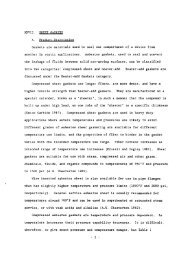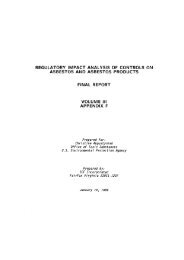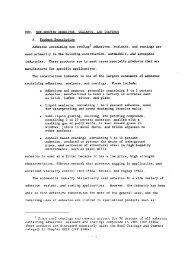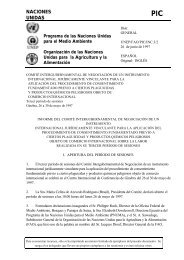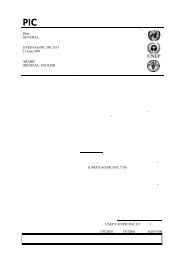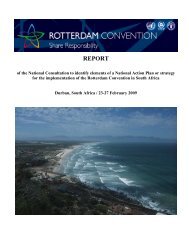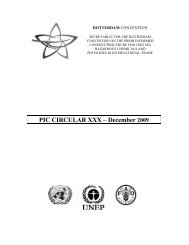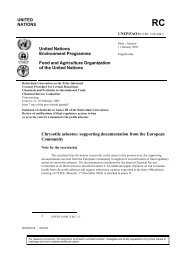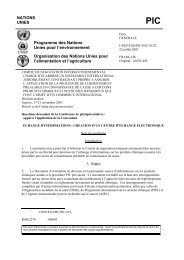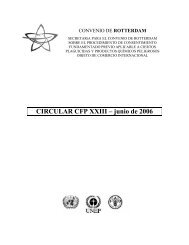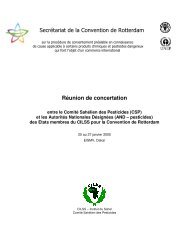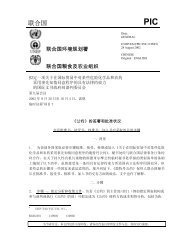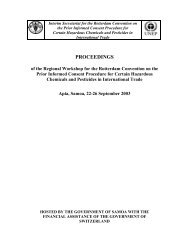INC9 REPORT.pdf - Rotterdam Convention
INC9 REPORT.pdf - Rotterdam Convention
INC9 REPORT.pdf - Rotterdam Convention
Create successful ePaper yourself
Turn your PDF publications into a flip-book with our unique Google optimized e-Paper software.
UNEP/FAO/PIC/INC.9/21<br />
5. It would be beneficial for all stakeholders if the <strong>Convention</strong> entered into force as soon as possible.<br />
As an example of uncertainties during the transition period, she recalled that the European chemicals<br />
industry had agreed to implement, from 2001, its commitments to register export notifications, but only five<br />
notifications had been submitted in the European Community so far in 2002, a tiny percentage of the<br />
expected number.<br />
6. Ms. Altmann expressed the hope that monocrotophos and other chemicals, such as asbestos, would<br />
be added to the list of substances to be covered by the <strong>Convention</strong>. Germany had provided a total of<br />
€280 million over the previous 15 years for projects to assist developing countries and countries with<br />
economies in transition in ratifying and implementing the <strong>Convention</strong>, and would continue to provide<br />
whatever support it could. She urged all participants to work together under the shared responsibility called<br />
for in the <strong>Convention</strong>.<br />
7. Eleven United Nations institutions had moved to Bonn in recent years and another was to arrive in<br />
January 2003. The number of United Nations staff in Bonn would soon pass 600. The United Nations<br />
Campus to be created around the International Congress Centre would offer ideal conditions for the<br />
Secretariats of PIC and the closely linked Stockholm <strong>Convention</strong> on Persistent Organic Pollutants (POPs),<br />
both of which Germany would like to host in Bonn.<br />
8. Ms. Dieckmann welcomed the participants and said that the people of the Federal Republic of<br />
Germany, one of the biggest exporters of chemicals, took respect for safety rules when handling hazardous<br />
chemicals very seriously. She described the history of the Congress Centre and the planned creation of a<br />
United Nations Campus in and around the former buildings of the West German Parliament, to develop<br />
Bonn as a place of global dialogue, a centre for environment, health and development and a centre of<br />
international cooperation and science. The construction of a second, even larger, congress hall would soon<br />
be put into action. That had been laid down in an agreement signed in the presence of the Secretary-General<br />
of the United Nations, Mr. Kofi Annan, and the President of the Federal Republic of Germany, Mr. Johannes<br />
Rau, in February 2002. She said that suitable offices had been reserved in which the PIC and POPs<br />
Secretariats could be united under one roof.<br />
9. Mr. Töpfer welcomed participants to the meeting and expressed appreciation to the Government of<br />
Germany for hosting it. He also expressed thanks to the Governments of Canada, Germany, Italy,<br />
Madagascar, Norway, Sweden, Switzerland, the United Kingdom and the United States for their financial<br />
support to the <strong>Convention</strong> during 2002. He considered it vitally important for participants to bear in mind<br />
three key challenges currently facing the <strong>Convention</strong>.<br />
10. The first challenge lay in promoting ratification so that the <strong>Rotterdam</strong> <strong>Convention</strong> would enter into<br />
force at the earliest opportunity. Noting that the <strong>Convention</strong> had been ratified by 33 States, compared with<br />
16 at the time of the previous Intergovernmental Negotiating Committee the previous year, he considered<br />
that the regional workshops on the <strong>Convention</strong> played a significant role in encouraging countries to ratify.<br />
He urged Governments to move quickly so that the Conference of the Parties could hold its first session on<br />
the basis of widespread and representative participation.<br />
11. The second key challenge lay in capacity-building. The procedure would only function smoothly if<br />
all Parties were able to comply with its requirements. Noting that when the <strong>Convention</strong> entered into force,<br />
Article 16 on technical assistance would become operational, he suggested that there might be consideration<br />
of how to make a fast start in providing assistance to developing countries and countries with economies in<br />
transition.<br />
12. The third broad challenge lay in how to measure and review the <strong>Convention</strong>’s effectiveness. What<br />
kinds of performance indicators would do the job best? He suggested that tools such as monitoring of<br />
poisoning incidents around the world, as well as the rate of compliance with the PIC reporting procedure,<br />
could be helpful. Such indicators would reassure the public that the <strong>Convention</strong> was providing concrete and<br />
measurable improvement to health and the environment, and that there was widespread compliance.<br />
2



